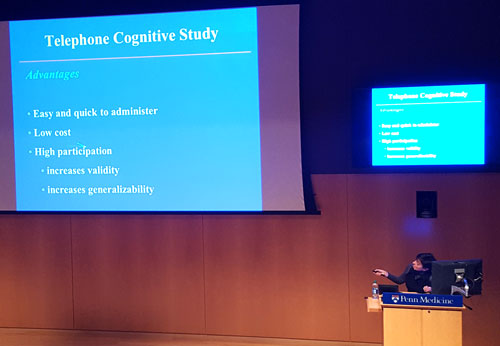When it comes to studying Alzheimer’s disease and related dementias, researchers could save money and reach more participants by using mail, phone and online programs in place of clinic visits.
“Asking someone to answer their phone once a year is much easier than asking them to come in for half a day,” said Dr. Fran Grodstein, Harvard professor and Brigham and Women’s Hospital epidemiologist, at the University of Pennsylvania Jan. 21. Grodstein was participating in the Institute on Aging’s Visiting Scholar Series.
Grodstein described two trials conducted by mail that had follow-up rates of 96 to 99 percent and a compliance rate of 80 percent while including almost 60,000 participants.
“This was the first evidence that you could do something easily and inexpensively pretty well,” she said, suggesting that the method could work in cognitive testing as well.
 Of course, not all cognitive testing can be done from afar, Grodstein said, but that which can shows results with similar accuracy compared to in-person testing.
Of course, not all cognitive testing can be done from afar, Grodstein said, but that which can shows results with similar accuracy compared to in-person testing.
The Nurses’ Health Study, a phone-based study running since 1976, has included more than 121,000 participants who were asked to report any subjective memory complaints they had. Researchers found the complaints to be an accurate representation of a participants’ cognitive status, and the study maintained a follow-up rate of 90 percent.
Grodstein also featured the work of Cogstate as an example of online-based cognitive testing. The Australian company developed a series of cognitive test batteries being used by researchers around the world. Since the test is conducted via an unsupervised online program, there is no manpower cost for each one. Grodstein called programs like this “highly effective and incredibly inexpensive.”
The next speaker in the Visiting Scholar Series will be Dr. Bruce Yankner, Harvard professor and co-director of the Paul F. Glenn Center for the Biology of Aging. He will speak 3 p.m. March 1 in the Smilow Center’s Arthur H. Rubenstein Auditorium. Please RSVP here.